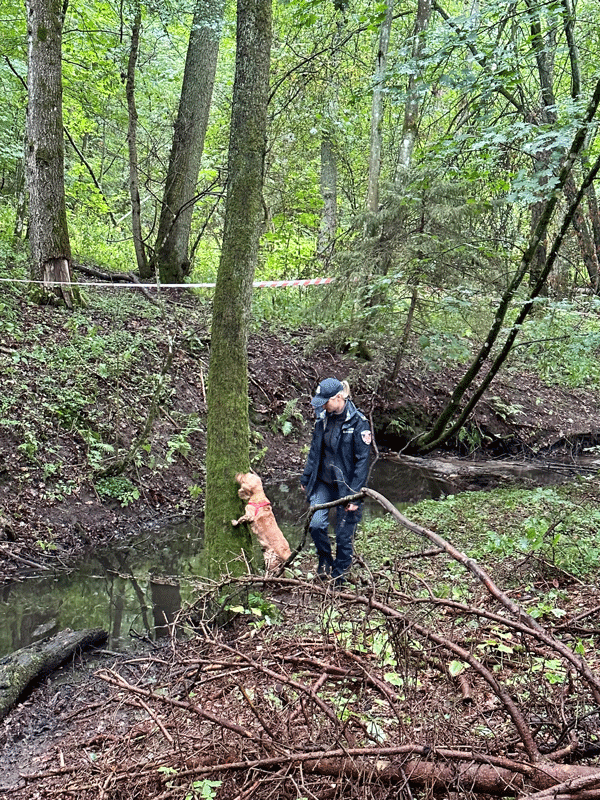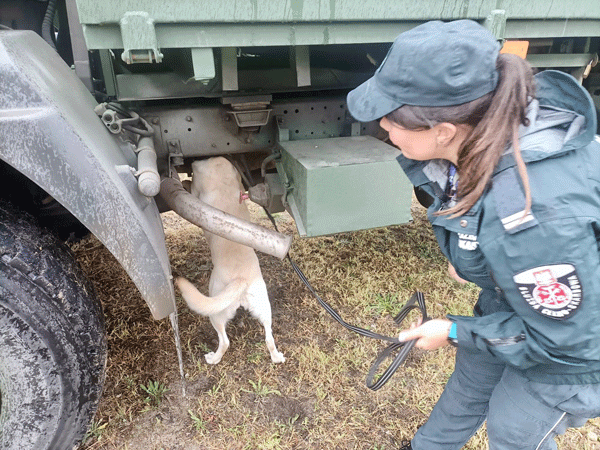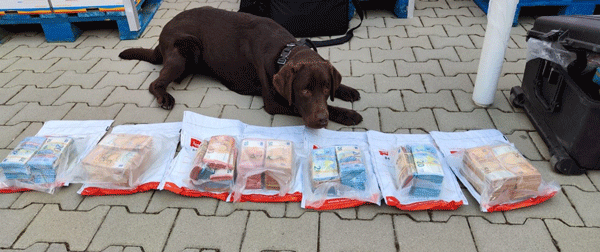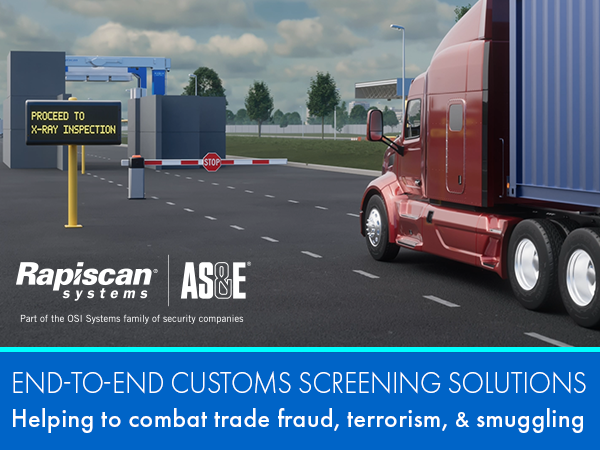Detector dogs: Polish Customs aims to foster regional cooperation
25 June 2024
By the Polish Customs Service, National Revenue Administration (NRA)Trained dogs are incredible chemical sensors, far better than even the most advanced technological device. But training novice handlers and dogs is a highly technical and challenging task. Polish Customs initially benefited from foreign technical assistance to build its capacity in this domain, but it has now developed enough expertise to help others, and aims to foster the exchange of expertise in a field of increasing promise and interest.
From humble beginnings, a vibrant training centre has emerged
Polish Customs has been working with detector dogs since the 1970s. In 1973, a few months after setting up its first dog and handler teams, it received the support of Finnish Customs representatives who came to Poland to share their experience of combatting drug smuggling using dogs. Their visit took place under an Agreement on cooperation and mutual assistance in Customs matters signed in Helsinki in October 1972.
At that time, Polish Customs did not have its own training centre and was using infrastructure belonging to the Police Canine Department for training purposes. Not until 2000 was a Customs Service Dog Training Centre created. When the first training sessions at the new Centre began in 2001 there were 25 service dogs in Customs, trained to detect narcotic drugs and tobacco products.
During the period from 2015 to 2021 a complete modernization of the Centre’s infrastructure was carried out, and the living and working conditions of the dog handlers and service dogs improved greatly. A new building was constructed with efficient heating, ventilation and air-conditioning systems plus several yards (including new sanitary and bathing areas). The Centre also has a well-equipped classroom, an auditorium, a training yard, and a large covered area which ensures training can take place even in adverse weather conditions. To simulate real-world conditions, trainers have at their disposal 30 vehicles (including cars, buses and trucks) and several “rooms”.

Today, the Customs Service Dog Training Centre is a modern complex that can accommodate 54 officers and 24 dogs at a time. The officers have access to a covered barbecue area, table football, a table tennis table, bicycles, a volleyball court and physical exercise equipment. Each dog has its own pen and separate run.
The Training Centre, covering over four hectares, is located in the village of Kamion in East-Central Poland, on an island next to the Rawka River. Adjacent to the Bolimowski Landscape Park, it is truly a beautiful place. In the afternoons, once the training session is over, the handlers can take relaxing walks with their service dogs in a one-of-a-kind environment.
139 detector dog teams
There are currently 139 dogs of various breeds and 139 handlers on active duty, and two teams are undergoing basic training. According to the “Report on Training and Use of Canine Teams in Customs and Law Enforcement Administrations of the WCO Europe Region”, prepared in 2022 by the Regional Dog Training Centre of Khmelnitsky in Ukraine, Polish Customs has the third biggest Canine Team Unit in the Europe region, after the Guardia Civil in Spain and Germany’s Customs Federal Service.
Some canine teams are assigned to specific points of entry, while others work as part of a mobile unit. In the course of their daily work, they check mail and courier shipments, cars and trucks, aircraft and sea vessels, passengers’ luggage, and premises.
Polish Customs also has 52 retired dogs who are cared for by their former handlers till the end of their lives, with the Administration covering the cost of their food and veterinary care. The National Revenue Administration (NRA), which brings together the Tax Administration, the Customs Service and the Fiscal Control Service, was the first public service in Poland to introduce rules on retired service dogs, in 2017.

The NRA is divided into regional offices, and the purchase of dogs is carried out by each of these offices according to its needs, under the supervision of regional canine coordinators who themselves report to the national canine coordinator in the Ministry of Finance.
The dogs are purchased only from accredited kennels in Poland and abroad. A veterinarian and a dog instructor are always present during the process, to assess the dog’s health and look for qualities such as a responsive temperament, enjoyment of play, ability to focus, and appropriate response to loud noises and external stimuli.
Once selected, the dog is immediately assigned to a dog handler with whom he will train, work and with whom he will spend his entire life. This set-up enables handlers and dogs to forge a strong bond.
Customs and tax officers wishing to become dog handlers are required to have a driving licence, demonstrate resilience in the face of stress, know the Customs regulations, and have experience of conducting Customs inspections. They must also be in very good health and be highly motivated.
After initial selection they must go through a 2-stage process lasting several months, as follows:
- First, each officer spends one month as an intern with an experienced dog handler;
- Those who pass this first stage successfully go to the Dog Training Centre in Kamion, where they are tested for their ability to establish contact with a dog, as well as their knowledge of canine and detection theory, and enforcement practices. They are also interviewed by a committee of experts, including a psychologist.
Candidates who pass these two stages successfully are then sent on a theoretical course in animal behaviour and veterinary medicine.
Training
The Customs Service Dog Training Centre has two permanent instructors. In most regional offices there are other instructors who support their respective detector dog teams and canine coordinators.
All dogs and their handlers follow the same training curriculum, consisting of:
- dog care and handling instructions (1 week),
- basic training according to the specialty assigned to the dog (13 weeks),
- improvement training – certification (2 weeks, once a year).
The detector dog training programme focuses on the detection of the following commodities: narcotics, tobacco and tobacco products, banknotes, flora, animals and products of animal origin. Most of the dogs are trained to detect the smell of two of these categories of products – tobacco products and banknotes, tobacco products and narcotics, or narcotics and banknotes.
Only positive training methods are used; in other words, the dogs are rewarded for desired behaviours. Over the years, the trainers’ knowledge has expanded greatly thanks to the support of other Customs administrations; for example, it was through cooperation with German Customs’ canine instructors that the banknotes detection programme was initiated in Poland in 2016. Today, the NRA is the only service in Poland able to train dogs to detect the smell of banknotes, and therefore it also trains military dogs in this specific area of work.
Canine instructors also constantly expand their knowledge by participating in workshops and seminars organized by other services and canine-related organizations, both in Poland and abroad. Particularly noteworthy is the NRA’s past cooperation with the Polish Prison Service and Military Police, both of which are very open to exchanging experiences.

Looking ahead
In the first quarter of 2024, NRA canine experts visited Armenia under the European Commission Technical Assistance and Information Exchange instrument, to share knowledge and know-how with their Armenian counterparts about the training, maintenance and use of service dogs to combat narcotics smuggling.
The Administration believes it is now time to structure regional cooperation in the field of canine training. With this in mind, it has applied to the WCO Secretariat for the Customs Service Dog Training Centre to be accredited as a WCO Regional Dog Training Centre (RDTC). By seeking this accreditation, the Centre is striving to become a meeting place where experts from different countries in the region can learn from each other, identify solutions to the challenges they face, continuously enhance their work practices, examine the latest technological progress and discuss the future of detector dog programmes.
According to scientists, the capability of dogs extends far beyond what we are currently training them to do; for example, some countries use dogs to detect electronics items (from tiny microSD cards to cell phones), by training them to recognize triphenylphosphine oxide (TPPO) – a compound used to coat the circuit boards in all storage devices to prevent them from overheating.
In Poland, a new Customs training programme has already been approved to train dogs to detect the smell of amber, and the Centre is currently working on obtaining amber samples for this purpose. Poland is home to large industrial deposits of amber, but illegal extraction and trafficking pose a major obstacle to the development of the legal amber industry.
Polish Customs will continue to look at opportunities to expand its detector dog programme, and to participate actively in developing the expertise of the Customs community in the use and training of detector dogs.
More information
anna.drozd@mf.gov.pl
elwira.adamczyk-szymkowiak@mf.gov.pl

